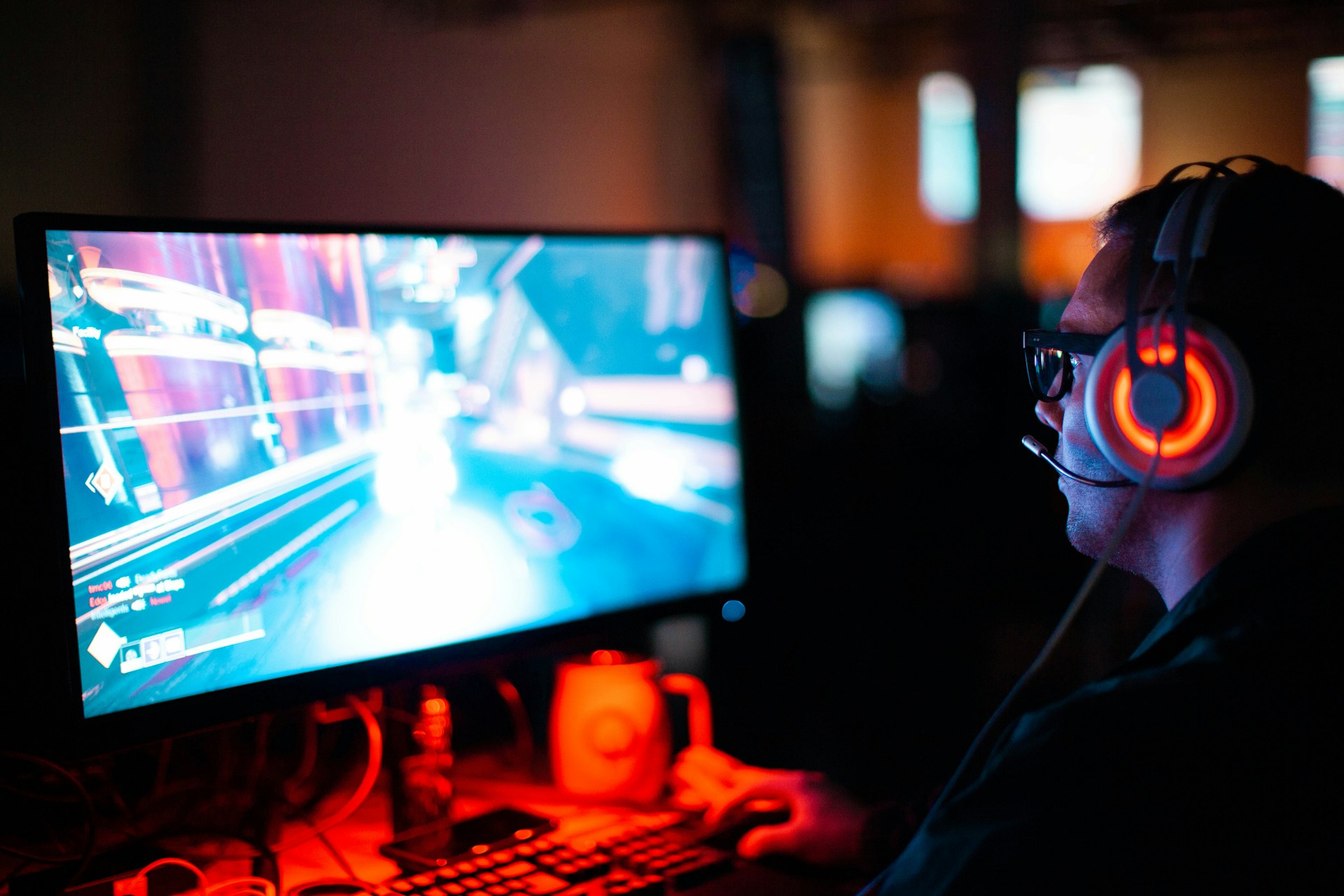Introduction
Remember that heart-pounding moment when you clutched victory in the final seconds of your online battle royale match? Or the awe-inspiring landscapes that left you breathless while exploring a sprawling open-world RPG? These experiences wouldn’t be possible without the powerful hardware driving your gaming experience. But for dedicated gamers who crave the ultimate in performance and portability, a standard laptop simply won’t cut it. Enter the world of high-performance gaming laptops, meticulously crafted machines designed to deliver desktop-grade power within a sleek, mobile package.
What are High-Performance Gaming Laptops?
High-performance gaming laptops are portable computers specifically designed to handle the demanding graphical and processing requirements of modern video games. Unlike their everyday counterparts, gaming laptops boast powerful CPUs (Central Processing Units), dedicated GPUs (Graphics Processing Units), and high-performance components to ensure smooth gameplay, stunning visuals, and the ability to run even the most graphically intensive titles at high settings. They often come equipped with features like high refresh rate displays for silky-smooth visuals, customizable keyboards optimized for gaming, and robust cooling systems to handle the heat generated during intense gaming sessions.
Why Choose a High-Performance Gaming Laptop?
While traditional desktop computers might offer superior power and upgradability, high-performance gaming laptops offer a unique set of advantages:
a. Portability:
Take your gaming experience anywhere! Whether you’re attending LAN parties, traveling to tournaments, or simply lounging on the couch, gaming laptops offer the freedom to play wherever you feel most comfortable.
b. Convenience:
No need for a dedicated desk setup. Gaming laptops are self-contained units, ready to go the moment you power them on.
c. Versatility:
High-performance laptops are powerful enough to handle not just gaming, but also demanding tasks like video editing, 3D modeling, and creative work.
Of course, there are also some drawbacks to consider:
a. Cost:
High-performance gaming laptops come at a premium price compared to standard laptops.
b. Upgradability:
While some components might be user-upgradeable (like RAM and storage), the core components like CPU and GPU are typically soldered onto the motherboard, limiting future upgrade potential.
Who Should Consider a High-Performance Gaming Laptop?
If you’re a serious gamer who demands the best possible performance and visual fidelity, a high-performance gaming laptop is a compelling option. This category particularly caters to:
a. Competitive Gamers:
Every frame counts in fast-paced esports titles. High refresh rate displays and powerful hardware ensure lightning-fast responsiveness and smooth gameplay, giving you a competitive edge.
b. Content Creators and Streamers:
Modern games are often resource-intensive for recording and streaming. High-performance laptops provide the processing power to handle both gameplay and streaming software simultaneously.
c. Gamers on the Go:
Frequent travelers or students who value portability without sacrificing performance will appreciate the ability to game on their own terms, anywhere they choose.
Essential Hardware Considerations for High-Performance Gaming
Selecting the right high-performance gaming laptop requires understanding the key hardware components that influence your gaming experience. Here’s a breakdown of the crucial factors to consider:
1. Processors (CPUs):
The CPU acts as the brain of your computer, handling all the game’s calculations and instructions. Here’s what to consider when choosing a CPU for a gaming laptop:
a. Core Count and Clock Speed:
More cores and higher clock speeds translate to better multitasking and faster processing power. Aim for a CPU with at least 6 cores and a base clock speed of 3.0 GHz or higher for smooth gameplay. Popular choices for high-performance gaming laptops include Intel Core i7 processors (11th Gen or newer) and AMD Ryzen 7 processors (5000 series or newer).
b. Real-World Examples:
For instance, the Intel Core i7-12700H offers 14 cores and a boost clock speed of up to 4.7 GHz, making it a powerhouse for demanding games. Similarly, the AMD Ryzen 7 6800H boasts 8 cores and a boost clock of up to 4.7 GHz, delivering excellent performance for modern games.
2. Graphics Processing Units (GPUs):
The GPU is responsible for rendering the game’s visuals, determining the level of detail, textures, and overall graphical fidelity. Here’s what to consider when choosing a GPU for a gaming laptop:
a. Dedicated vs. Integrated Graphics:
Integrated graphics found in standard laptops are not suitable for high-performance gaming. Opt for a laptop with a dedicated GPU from NVIDIA GeForce or AMD Radeon.
b. VRAM (Video RAM):
VRAM stores graphical data for the GPU to access quickly. Higher VRAM allows for higher resolutions and more complex textures without sacrificing performance. Aim for at least 8GB of VRAM for smooth gameplay in modern titles.
c. NVIDIA GeForce vs. AMD Radeon:
Both brands offer powerful options for gaming laptops. NVIDIA GeForce GPUs are generally known for their raw power and performance in high-end games, while AMD Radeon GPUs often offer competitive performance at slightly lower price points.
d. Real-World Examples:
The NVIDIA GeForce RTX 3070 Laptop GPU with 8GB of VRAM is a popular choice for high-end gaming laptops, offering excellent performance at 1440p resolution with high settings. For those seeking a balance between performance and affordability, the AMD Radeon RX 6600M with 8GB of VRAM delivers smooth gameplay at 1080p with high settings.
3. Display:
The display is your window into the game world, and its quality significantly impacts your immersion. Here are the key display specifications to consider for a gaming laptop:
a. Resolution:
Higher resolutions (QHD, UHD) offer sharper visuals but require more powerful hardware and can impact battery life. Full HD (1920×1080) is a good balance for most gamers, while some may prefer QHD (2560×1440) for a sharper experience.
b. Refresh Rate:
Measured in Hertz (Hz), refresh rate refers to how many times the display refreshes the image per second. A higher refresh rate (120Hz, 144Hz, 240Hz) ensures smoother visuals, especially beneficial for fast-paced games. Opt for at least a 120Hz display for a noticeable improvement over the standard 60Hz.
c. Panel Type:
There are two main panel types: IPS and TN. IPS panels offer wider viewing angles and better color accuracy, while TN panels typically have faster response times but may suffer from limited viewing angles and color accuracy.
d. Trade-offs:
There are trade-offs to consider. Higher resolutions require more powerful GPUs, while higher refresh rates can impact battery life. Choose the specifications that best suit your priorities and budget.
4. RAM (Random Access Memory):
RAM acts as the computer’s short-term memory, storing frequently accessed data. Here’s what to consider when choosing RAM for a high-performance gaming laptop:
a. Minimum RAM:
For smooth gameplay and multitasking, aim for at least 16GB of RAM. Some high-end gaming laptops may come with 32GB of RAM, which can be beneficial for memory-intensive tasks like video editing alongside gaming.
5. Storage:
Storage space holds your games, applications, and files. Here’s what to consider when choosing storage for a gaming laptop:
HDD vs. SSD:
HDDs (Hard Disk Drives) offer larger storage capacities at lower costs but are slower. SSDs (Solid State Drives) provide significantly faster loading times and overall system responsiveness but have smaller capacities and higher price points.
Recommendation: An ideal setup would be a combination of both: a large capacity HDD for storing your game library and a smaller, but faster SSD for the operating system and frequently used applications. This balances speed and capacity effectively.
Additional Features to Consider in a High-Performance Gaming Laptop
Beyond the core hardware components, several additional features can enhance your gaming experience on a high-performance laptop:
a. Keyboard:
For extended gaming sessions, a comfortable and responsive keyboard is crucial. Look for features like:
Backlighting:
Essential for low-light environments.
Anti-ghosting:
Ensures all key presses are registered accurately, even when multiple keys are pressed simultaneously.
Customizable Macro Keys:
Programmable buttons for quick access to in-game commands or actions.
b. Battery Life:
High-performance gaming laptops are not known for long battery life due to their powerful hardware. However, some laptops offer battery-saving features or integrate energy-efficient components to extend unplugged use. Remember, demanding games will still drain the battery quickly, so having a nearby power outlet is recommended for serious gaming sessions.
c. Cooling System:
Heat generation is a natural byproduct of powerful hardware. A robust cooling system with efficient fans and heat sinks is essential to maintain optimal performance and prevent overheating during intense gaming.
d. Connectivity:
Ensure the laptop has enough ports to connect all your peripherals. Look for a variety of USB ports (including USB-A and USB-C), an HDMI port for connecting to external displays, and potentially an Ethernet port for a wired internet connection (especially beneficial for competitive online gaming).
e. Weight and Portability:
High-performance laptops tend to be heavier than standard laptops due to their powerful components and robust cooling systems. Consider how much portability is important to you and choose a laptop with a weight and size that suits your needs.
f. Build Quality and Aesthetics:
A well-built laptop with a durable chassis is important for a machine that will be used frequently. Gaming laptops often come with sleek and stylish designs with customizable lighting features that appeal to gamers. While aesthetics are subjective, prioritize build quality for long-lasting performance.
Setting a Budget and Popular Brands
Budgeting:
High-performance gaming laptops range in price from around $1,000 to well over $3,000. The final cost depends on the specific hardware configuration you choose. Here’s a general breakdown:
a. Entry-Level (Under $1,500):
These laptops can handle most modern games at 1080p resolution with moderate settings. They may have mid-range CPUs and GPUs like NVIDIA GeForce GTX 1650 or AMD Radeon RX 5600M.
b. Mid-Range ($1,500 – $2,500):
This category offers a good balance between price and performance, allowing for smooth gameplay at 1080p with high settings or 1440p with moderate settings. Common GPUs in this range include NVIDIA GeForce RTX 3060 or AMD Radeon RX 6700M.
c. High-End (Over $2,500):
Top-of-the-line laptops boast the most powerful hardware, capable of running the latest games at 1440p or even 4K resolution with high settings and frame rates exceeding 144Hz. These laptops often feature NVIDIA GeForce RTX 3070, 3080, or AMD Radeon RX 6800M and above graphics cards.
Remember, these are just general guidelines. Specific models and configurations can vary in price within each range.
Popular Brands:
Several reputable brands specialize in high-performance gaming laptops. Here are a few of the most popular ones:
a. ASUS ROG (Republic of Gamers):
A well-established brand known for powerful and innovative gaming laptops with a focus on performance and design.
b. MSI:
Offers a wide range of gaming laptops at various price points, often featuring high-performance hardware and customizable features.
c. Razer:
Produces premium gaming laptops with a focus on sleek aesthetics, high refresh rate displays, and powerful hardware.
d. Lenovo Legion:
Offers a variety of gaming laptops known for their balance between performance and value.
e. Alienware (by Dell):
Caters to hardcore gamers with powerful and feature-rich gaming laptops, often with a distinct and customizable design aesthetic.
These are just a few examples, and numerous other brands offer compelling options in the high-performance gaming laptop market. It’s crucial to research specific models and compare their features and specifications to find the best fit for your budget and gaming needs.
Benchmarks, Performance Considerations, and Future-Proofing
Beyond understanding individual hardware components, it’s important to consider how they work together to deliver actual gaming performance. Here are some key factors to keep in mind:
a. Benchmarks:
Benchmarks are standardized tests that measure a computer’s performance in specific tasks, including gaming. Popular benchmarks for gaming laptops include:
3DMark:
This suite of benchmarks tests the graphics processing capabilities of a laptop. Higher scores indicate better performance in graphically demanding games.
Unigine Heaven/Superposition:
These benchmarks offer a visually stunning stress test that pushes your laptop’s graphics capabilities to the limit.
In-Game Benchmarks:
Many modern games have built-in benchmark tools that allow you to test performance at different graphics settings.
Running benchmarks on laptops you’re considering, or checking online benchmark results for specific models, can give you a good idea of their real-world gaming performance compared to others. However, it’s important to look beyond raw benchmark scores:
Game Optimization:
Some games may be better optimized for specific hardware configurations, so researching how a particular game performs on a specific laptop model can be valuable.
Minimum vs. Recommended Specs:
Most games list minimum and recommended system requirements. While meeting the minimum specs might allow you to run the game, the experience may not be ideal. Aiming for a laptop that exceeds the recommended specs ensures smooth gameplay at your desired settings.
b. Future-Proofing:
The gaming landscape is constantly evolving, and new games with ever-increasing graphical demands are released regularly. If you want your high-performance laptop to last for several years, consider “future-proofing” your purchase by prioritizing certain aspects:
Upgradability:
While some components like RAM and storage might be user-upgradeable, consider how future-proof the core components (CPU and GPU) are. Opting for the latest generation CPUs and GPUs with ample processing power will ensure they can handle upcoming games effectively.
Display Technology:
A high refresh rate display (120Hz or higher) will likely remain relevant for years to come, enhancing your experience in fast-paced games.
Thermal Management:
A well-designed cooling system is crucial for maintaining performance and preventing overheating. Look for laptops with efficient cooling solutions to ensure your hardware stays cool even during demanding games.
Selecting the Right High-Performance Gaming Laptop for You
Now that you understand the essential hardware considerations, features, and performance factors, you’re well-equipped to choose the perfect high-performance gaming laptop for your needs. Here’s a step-by-step approach:
Define Your Budget:
Determine how much you’re comfortable spending on a gaming laptop. This will guide your search within the various price ranges discussed earlier.
Identify Your Priorities:
Consider what aspects are most important to you. Do you prioritize raw performance, portability, battery life, or a specific feature like a high refresh rate display?
Research Specific Models:
Based on your budget and priorities, shortlist a few laptop models that seem like good options. Research online reviews, benchmark results, and user feedback to get a comprehensive understanding of each model’s strengths and weaknesses.
Compare Specifications:
Once you have a shortlist, compare the detailed specifications of each laptop. Pay close attention to CPU, GPU, RAM, storage, display resolution and refresh rate, and any unique features offered by each model.
Read Reviews and Watch Videos:
In-depth reviews from tech publications and user video reviews can provide valuable insights into real-world performance, build quality, thermals, and user experience with a specific laptop model.
Consider Brand Reputation:
Research the reputation of the brands you’re considering. Look for brands known for quality, reliability, and good customer support.
Remember: Don’t solely rely on the highest-end specs or flashy marketing claims. Choose a laptop that strikes a balance between performance, features, and your budget to get the best value for your gaming needs.
Conclusion
The world of high-performance gaming laptops offers a plethora of options to suit various budgets and gaming styles. By understanding the key hardware components, performance considerations, and essential features, you’re now equipped to make an informed decision and select the perfect machine to power your gaming adventures.
Whether you’re a seasoned esports competitor, a content creator demanding a powerful editing machine, or a casual gamer who appreciates stunning visuals and smooth gameplay, a high-performance gaming laptop can unlock a world of possibilities. Remember, the ideal laptop is the one that perfectly complements your gaming needs and preferences. Happy hunting!




